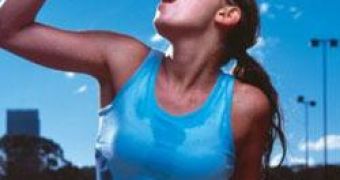Energy drinks help you pump more alcohol than usual. But this does nothing more than to increase the effect of alcohol, as revealed by a novel study made at Wake Forest University School of Medicine.
Student subjects who mixed alcohol with energy drinks were twice more vulnerable to injuries, and twice more likely to get into the hospital or ride with a drunk driver, compared to those who did not drink alcohol accompanied by energy drinks. The first category of subjects was also twice more likely to commit sexual abuse. The research was made on a pool of 4,271 college students from 10 universities.
"We knew anecdotally, from speaking with students, and from researching internet blogs and websites , that college students mix energy drinks and alcohol in order to drink more, and to drink longer. But we were surprised that the risk of serious and potentially deadly consequences is so much higher for those who mixed energy drinks with alcohol, even when we adjusted for the amount of alcohol.", said lead researcher Dr. Mary Claire O'Brien, associate professor of emergency medicine and public health sciences.
Mixing energy drinks with alcohol made subjects consume more alcohol during a typical drinking session (5.8 drinks versus 4.5 drinks), and in binge sessions, even 36 % more (8.3 against 6.1). The number of weekly drinking sessions were also double for those adding energy drinks to alcohol (1.4 versus 0.73 days/week).
The subjects completed a questionnaire of about 300 questions concerning alcohol use and its effects on health and behavior. 24% had drunk alcohol mixed with energy drinks. The categories more prone to this mix consume were male, white, intramural athletes, Greek society members or pledges, or older.
"This is not surprising since the energy drink companies typically tout non-essential ingredients like taurine which is rumored to raise exercise capacity, and ginseng, which some companies claim enhances libido. The main ingredient in energy drinks is caffeine," said O'Brien.
"Mixing caffeine (a stimulant) with alcohol (a depressant), is like getting into a car and stepping on the gas pedal and the brake at the same time. Students whose motor skills, visual reaction times, and judgment are impaired by alcohol may not perceive that they are intoxicated as readily when they're also ingesting a stimulant. Only the symptoms of drunkenness are reduced - but not the drunkenness. They can't tell if they're drunk; they can't tell if someone else is drunk. So they get hurt, or they hurt someone else.", said O'Brien.
The Food and Drug Administration (FDA) has put a threshold of 65 mg caffeine per serving of a food or beverage, but energy drinks - which at the moment are not under FDA control - can comprise up to 300 mg of caffeine in a sole serving.
"29 state attorneys general have already condemned alcoholic energy drinks. We believe the FDA has a responsibility to investigate the health risks of energy drink cocktails, and to make that information available to consumers. Students should be informed about the risks of mixing alcohol with energy drinks, as part of an overall program to reduce high-risk drinking and its consequences. And colleges should reconsider the free distribution of energy drinks at campus-sponsored events.", said O'Brien.

 14 DAY TRIAL //
14 DAY TRIAL //